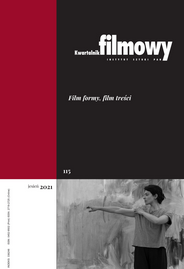Zniewala czy wyzwala? Dzieje grzechuWaleriana Borowczyka jako film polityczny
Enslaving or Liberating? Walerian Borowczyk’s The Story of Sin as a Political Film
Author(s): Sebastian JagielskiSubject(s): Gender Studies, Film / Cinema / Cinematography
Published by: Instytut Sztuki Polskiej Akademii Nauk
Keywords: Walerian Borowczyk; emancipation; biopolitics; body;
Summary/Abstract: In The Story of Sin (Dzieje grzechu, 1975), Walerian Borowczyk shows the oppression of the Catholic, national (bourgeois), and patriarchal systems through the visualisation of “oppression expression” and “expression oppression”. Following Elena del Río’s reflection, the author attempts to challenge the claims of those researchers who saw in Borowczyk’s film only a spectacle of the objectified female body. He argues that although the spectacle hinders the narrative, it does not block the expression of the body. On the contrary, it releases its power by loosening the structures of the film narrative. The body movement of Ewa Pobratyńska, the film heroine, is as much a reaction to the oppressive reality (the home and the Church) as it is a promise to break through a pattern of life based on compulsive repetition. Adopting the terminological distinction between biopower and biopolitics suggested in Michel Foucault’s writings, the author recognizes in The Story of Sin political potential aimed at a disciplinary society founded on the supervision of bodily and sexual practices.
Journal: Kwartalnik Filmowy
- Issue Year: 2021
- Issue No: 115
- Page Range: 163-176
- Page Count: 14
- Language: Polish

